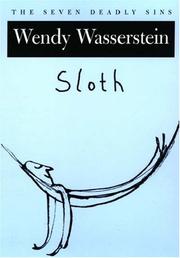| Listing 1 - 5 of 5 |
Sort by
|

ISBN: 9780195312096 0195312090 9780195166309 0195166302 019803721X 1281346950 143560928X 9786611346959 0190290307 9780198037217 Year: 2005 Publisher: Oxford New York
Abstract | Keywords | Export | Availability | Bookmark
 Loading...
Loading...Choose an application
- Reference Manager
- EndNote
- RefWorks (Direct export to RefWorks)
Here is a rollicking parody of the self-help genre, one that skewers the couch-bound, apathetic mentality so pervasive in America today. With tongue in cheek, Sloth guides readers step-by-step toward a life of noncommittal inertia. ""You have the right to be lazy,"" writes Wasserstein. ""You can choose not to respond. You can choose not to move."" Readers will find out the importance of Lethargiosis--the process of eliminating energy and drive, the vital first step in becoming a sloth. To help you attain the perfect state of indolent bliss, the book offers a wealth of self-help aids. Readers
General ethics --- Laziness --- Indolence --- Sloth --- Deadly sins --- Personality --- Laziness - Humor
Book
ISBN: 1282426885 9786612426889 0226736571 9780226736570 Year: 1984 Publisher: Chicago University of Chicago Press
Abstract | Keywords | Export | Availability | Bookmark
 Loading...
Loading...Choose an application
- Reference Manager
- EndNote
- RefWorks (Direct export to RefWorks)
The Deer and the Tiger is Schaller's detailed account of the ecology and behavior of Bengal tigers and four species of the hoofed mammals on which they prey, based on his observations in India's Kanha National Park. "This book is a treasure house of biological information and it is also a delight to read. . . . Excellent phoographs accompany the text."-Robert K. Enders, American Scientist "The one book that has been my greatest source of inspiration is The Deer and the Tiger by George Schaller, based on the first ever scientific field study of the tiger. . . . This book is written by a scientist, but speaks from the heart. . . . It reveals startling information on feeding habitats, territorial behaviour, and the nuances that make up the language of the forest; you become totally immersed in the world of the tiger. . . . For all of us who work in tiger conservation, this book is the bible."-Valmik Thapar, BBC Wildlife
Mammals --- Tiger. --- Deer --- Deers --- Cervidae --- Leo tigris --- Panthera tigris --- Tigers --- Panthera --- Behavior. --- india, wildlife, nature, environment, environmentalism, conservation, preservation, ecology, bengal tiger, kanha national park, feeding, habitat, territorialism, territory, predation, nonfiction, deer, mammals, chital, barasingha, gaur, blackbuck, nilgai, sambar, population, python, jackal, fox, wild dog, striped hyena, sloth bear, jungle cat, leopard, communication, biology, science.

ISBN: 1282360175 0520940520 9786612360176 1435630394 9780520940529 1433711214 9781433711213 0520250559 9780520250550 0520250567 9780520250567 9781282360174 9781435630390 6612360178 Year: 2008 Publisher: Berkeley University of California Press
Abstract | Keywords | Export | Availability | Bookmark
 Loading...
Loading...Choose an application
- Reference Manager
- EndNote
- RefWorks (Direct export to RefWorks)
This new critical volume, the second to appear in the three-volume Lectura Dantis, contains expert, focused commentary on the Purgatorio by thirty-three international scholars, each of whom presents to the nonspecialist reader one of the cantos of the transitional middle cantica of Dante's unique Christian epic. The cast of characters is as colorful as before, although this time most of them are headed for salvation. The canto-by-canto commentary allows each contributor his or her individual voice and results in a deeper, richer awareness of Dante's timeless aspirations and achievements.
Italian literature. --- Ottovolante (Group of writers) --- Dante Alighieri, --- allegory. --- avarice. --- beatrice. --- cantos. --- christian epic. --- christianity. --- dante. --- divine comedy. --- divine destiny. --- earthly paradise. --- envy. --- ethical choices. --- excommunicates. --- free will. --- good vs evil. --- human love. --- lectura dantis. --- love. --- lust. --- lute maker. --- mount of purgatory. --- poetry and politics. --- purgatorio. --- purgatory. --- religion. --- repentance. --- revenge. --- ritual. --- saints and sinners. --- salvation. --- seven deadly sins. --- sloth. --- sordello. --- spiritual growth. --- spiritual. --- valley of the rulers. --- virgil.
Book
ISBN: 128306958X 9786613069580 1400838711 9781400838714 9780691148724 0691148724 9780691149271 0691149275 6613069582 Year: 2011 Publisher: Princeton, N.J. Oxford Princeton University Press
Abstract | Keywords | Export | Availability | Bookmark
 Loading...
Loading...Choose an application
- Reference Manager
- EndNote
- RefWorks (Direct export to RefWorks)
We think of the Enlightenment as an era dominated by ideas of progress, production, and industry--not an era that favored the lax and indolent individual. But was the Enlightenment only about the unceasing improvement of self and society? The Pursuit of Laziness examines moral, political, and economic treatises of the period, and reveals that crucial eighteenth-century texts did find value in idleness and nonproductivity. Fleshing out Enlightenment thinking in the works of Denis Diderot, Joseph Joubert, Pierre de Marivaux, Jean-Jacques Rousseau, and Jean-Siméon Chardin, this book exp
Laziness. --- Enlightenment --- Indolence --- Sloth --- Deadly sins --- Personality --- Bonnet de nuit. --- Bulles de savon. --- Cartesian thought. --- Denis Diderot. --- Diderot. --- Enlightenment thinking. --- Enlightenment. --- Georges-Jacques Danton. --- Jean-Jacques Rousseau. --- Jean-Simon Chardin. --- Joseph Joubert. --- Louis-Sbastien Mercier. --- Michel Foucault. --- Pierre Carlet de Marivaux. --- Pierre de Marivaux. --- Rameau's Nephew. --- alternative subjectivation. --- authority. --- bourgeois. --- contemplation. --- domestic interiors. --- dsoeuvrement. --- efficiency. --- effort. --- eighteenth century. --- functionality. --- idleness. --- idler. --- industrialization. --- journalist. --- labor. --- laziness. --- leisure. --- modernity. --- moralist. --- nonproductivity. --- philosopher. --- philosophical writings. --- philosophy. --- pillow. --- political philosopher. --- politics. --- productivity. --- sensory cogito. --- solid reality. --- subjectivity. --- subtlely. --- utopia. --- writing.
Book
ISBN: 1501752502 1501752529 1501752537 1501752510 Year: 2021 Publisher: Ithaca : ILR Press,
Abstract | Keywords | Export | Availability | Bookmark
 Loading...
Loading...Choose an application
- Reference Manager
- EndNote
- RefWorks (Direct export to RefWorks)
When people cannot find good work, can they still find good lives? By investigating this question in the context of South Africa, where only 43 percent of adults are employed, Christine Jeske invites readers to examine their own assumptions about how work and the good life do or do not coincide. 'The Laziness Myth' challenges the widespread premise that hard work determines success by tracing the titular 'laziness myth,' a persistent narrative that disguises the systems and structures that produce inequalities while blaming unemployment and other social ills on the so-called laziness of particular class, racial, and ethnic groups. Jeske offers evidence of the laziness myth's harsh consequences, as well as insights into how to challenge it with other South African narratives of a good life.
Work --- Work ethic. --- Well-being. --- Unemployment --- Unemployed --- Quality of life. --- Laziness. --- Happiness. --- Blacks --- Happiness --- Quality of life --- Well-being --- Laziness --- Work ethic --- Ethic, Work --- Ethics --- Indolence --- Sloth --- Deadly sins --- Personality --- Work, Psychology of --- Joblessness --- Employment (Economic theory) --- Full employment policies --- Labor supply --- Manpower policy --- Underemployment --- Jobless people --- Out-of-work people --- Unemployed people --- Unemployed workers --- Persons --- Welfare (Personal well-being) --- Wellbeing --- Health --- Wealth --- Life, Quality of --- Economic history --- Human ecology --- Life --- Social history --- Basic needs --- Human comfort --- Social accounting --- Work-life balance --- Gladness --- Emotions --- Cheerfulness --- Contentment --- Pleasure --- Psychological aspects. --- Social aspects. --- Attitudes. --- Employment. --- Social aspects --- Employment --- South Africa. --- Africa, South --- Industry (Psychology) --- Method of work --- Work, Method of --- Human behavior --- Labor --- Occupations --- the good life, causes of unemployment, racism in the workplace, unemployment in south africa, neoliberal entrepreneurial narrative. --- Black persons --- Negroes --- Ethnology --- Black people
| Listing 1 - 5 of 5 |
Sort by
|

 Search
Search Feedback
Feedback About UniCat
About UniCat  Help
Help News
News